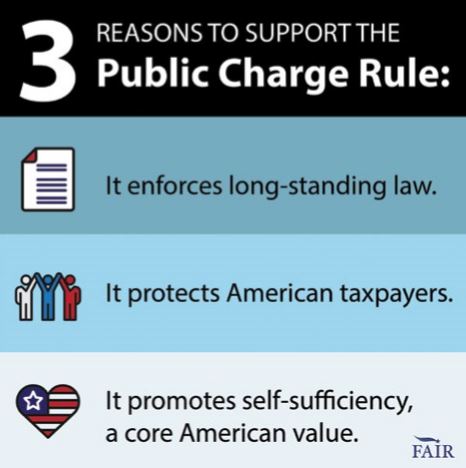A basic principle of U.S. immigration law – dating as far back as the colonial period – is that immigrants, barring extenuating and unforeseen circumstances, should be self-reliant. That principle was codified into our laws in 1882, and reaffirmed as recently as 1996.
On August 14, the Trump administration published a new public charge rule aimed at ensuring that the commitments made by immigrants and their sponsors are honored, and that assurances that American taxpayers will not be burdened with unnecessary costs are kept. These new rules will take effect on October 15 (unless implementation is delayed by the courts).
Though our laws bar the admission of people who are likely to wind up as public charges, regulations promulgated by previous administrations – most notably, the Clinton administration – unrealistically excluded many forms of public assistance from consideration of whether an immigrant is considered a public charge.
The rule change published in August offers a much more realistic definition. It defines the term “public charge” as an individual receiving one or more designated public benefits for more than 12 months, in the aggregate, within any 36-month period. In this case, the receipt of two benefits in one month counts as two months. The rule also defines the term “public benefit” to include any cash benefits for income maintenance, Supplemental Security Income (SSI), Temporary Assistance to Needy Families (TANF), Supplemental Nutritional Assistance Program (SNAP, or “food stamps”), most forms of Medicaid, and certain housing programs.
Certain non-immigrant aliens would also be ineligible to change their status or extend their stay if they have received designated public benefits above the designated threshold. Many foreign nationals arrive on temporary visas in the hopes of adjusting to permanent residence. The rule does not apply to certain categories, including active-duty members of the military and refugees or asylees. The new rule is a step in the right direction and represents a common-sense approach to immigration reform.
The rule change is a response to increasing welfare dependency by legal immigrants who are admitted based on having family members in the U.S., rather than on objective factors such as education and jobs skills. More than half of all immigrant-headed households now rely on at least one public assistance program – about double the rate of usage by native-headed households, according to the Center for Immigration Studies. The rule change also recognizes that legal immigrants have sponsors who have committed to addressing the needs of the people they bring to the United States, and aims to ensure that the sponsors honor those commitments.
Importantly, the new rule applies to the issuance of new green cards. Immigrants who already have green cards will not be affected by the change.
Predictably, the proposed rule change was immediately challenged by a lawsuit filed by 13 states, despite the fact that it strictly adheres to the law. In 1996, Congress referred to “a compelling government interest to enact new rules for eligibility and sponsorship agreements in order to assure that aliens be self-reliant in accordance with national immigration policy.” It acted on that compelling interest by:
• Requiring sponsors of immigrants to assume financial responsibility for that immigrant.
• Requiring petitioners to sign a legally binding affidavit of support acknowledging their financial responsibility.
• Empowering states to deny welfare benefits to most illegal aliens and lawful immigrants.
• Barring illegal aliens from welfare programs that receive federal funds.
• Rendering immigrants ineligible for means-tested federal benefits for five years after admission to the United States.
The rule change also highlights the need to scrap our family chain migration policies and replace it with a merit-based immigration system, similar to those in place in most developed nations. Legislation, most notable the RAISE Act (S. 1103), introduced by Senators Tom Cotton (R-Ark.) and David Perdue (R-Ga.) would eliminate automatic immigration entitlements for many extended family members, expedite admission of nuclear family members, and place greater emphasis on admission of immigrants with needed skills and education. The bill is strongly backed by FAIR.















